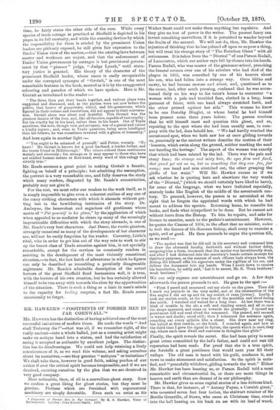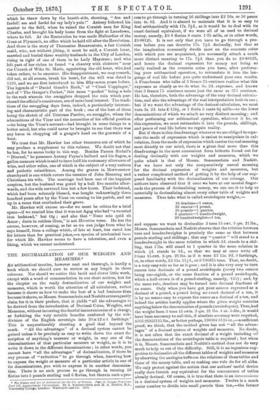MR. HAWKER'S " FOOTPRINTS OF FORMER MEN IN FAR CORNWALL."*
MR. HAWKER has the distinction of having achieved one of the most successful imitations of modern times. He made the words " And shall Trelawny die ?"—that was all, if we remember right, of the really ancient—into a whole ballad, just as a cunning artist might make an antique hand into a statue, and had the satisfaction of seeing it accepted as authentic by excellent judges. The distinc- tion has its disadvantages. We could not help retaining a lively consciousness of it, as we read this volume, and asking ourselves about its narratives,—are they genuine " antiques " or imitations?' We shall take them, however in good faith, asking pardon of our author if ever the critical spirit becomes irrepressible, and if we are deceived, excusing ourselves by the plea that we are deceived in very good company.
Most noticeable, then, of all is a marvellous ghost story. Now we confess a great liking for ghost stories, but they must be genuine. Fictions which are furnished with supernatural machinery are simply detestable. Even such an artist as Sir
• Footprints of Former Men in Per Cornwall. By B. S. Hawker, Vicar of 7dorwenstow. London: John Russell Smith. 1870.
Walter Scott could not make them anything but repulsive. And they give no test of power in the writer. The poorest fancy can invent something marvellous, if it is permitted to wander beyond the limits of the natural. We will not do, then, Mr. Hawker the injustice of thinking that he has palmed off upon us so poor a thing, but will treat his strange story of "The Botathen Ghost" with all seriousness. It is taken from the " Diurnal " of one Parson Rudall, of Launceston, which our author says fell by chance into his hands. Parson Rudall, who was master of the grammar-school, preaching the funeral sermon over one of his scholars who had died of the plague in 1665, was consulted by one of his hearers about his son, who had fallen into a strange way. Once blithe and merry, he had become morose and silent, and, questioned as to the cause, had, after much pressing, confessed that he was accus-
tomed daily on his way to his tutor's house to encounter "a woman with a pale and troubled face, clothed in a long, loose
garment of frieze, with one hand always stretched forth, and the other pressed against her side." This woman he knew to be one Dorothy Dinglet, at whose burial he had himself been present some three years before. The parson resolves that he will himself meet and question this ghost, and so, repairing to the spot where she had been usually seen, in com- pany with the lad, does behold her. " We had hardly reached the accustomed spot, when we both saw her at once gliding towards us, punctually as the ancient writers describe the motion of their lemures, which swim along the ground, neither marking the sand
nor bending the herbage.' The aspect of the woman was exactly that which had been related by the lad. There was the pale and stony face ; the strange and misty hair, the eyes firm and fixed, that gazed yet not on us, but on something that they saw far, far away; one hand and arm stretched out, the other grasping the
girdle of her waist." Will Mr. Hawker excuse us if we ask whether he is quoting here and elsewhere the very words of the "Diurnal," (which we should certainly have liked to have), for some of the language, what we have italicized especially, scarcely looks like English of the middle of the seventeenth cen- tury. To proceed, however, the parson is so astonished at the sight that he forgets the appointed words with which he had meant to address the spectre. Returning home, he consults his books, and finds what is:expedient to be done. But he cannot act without leave from the Bishop. To him he repairs, and asks for
licence to exorcize, much to the prelate's astonishment. However, he quotes the Canons of 1604, to the effect that no minister, unless , he hack the licence of his diocesan bishop, shall essay to exorcise a spirit, evil or good. He then proceeds to argue the question till,
as we read :—
" The upshot was that he did call in his secretary and command him to draw the aforesaid faculty, forthwith and without further delay, assigning him a form, insomuch that the matter was incontinently done, and after I had disbursed into the secretary's hands certain moneys for signitary purposes, as the manner of such officers hath always been, the Bishop did himself affix his signature under the sigillum of his see, and deliver the document into my hands. When I knelt down to receive his benediction, he softly said, Let it be secret, Mr. R. Weak brethren ! weak brethren !'" We can only express our astonishment and go on. A few days afterwards the parson proceeds to act. He goes to the spot :— " First I paced and measured out my circle on the grass. Then did I mark my pentacle in the very midst, and at the intersection of the five angles I did set up and fix my crutch of raun [rowan]. Lastly, I took my station south, at the true line of the meridian and stood facing due north. I watched and waited for a long time. At last there was a kind of trouble in the air, a soft and rippling sound, and all at once the shape appeared, and come on towards me gradually. I opened my parchment roll and read aloud the command. She paused, and seemed to waver and doubt; stood still ; then I rehearsed the sentence again, sounding out every syllable like a chant. She drew near my ring, but halted at first outside, on the brink. I sounded again, and now at the third time I gave the signal in Syriac, the speech which is used, they say, where such ones dwell and converse in thoughts that glide."
Finally, the spirit reveals the secret. She had been privy to some great crime committed by the lad's father, and could not rest till reparation had been made. For proof that she is a true spirit, she foretells a great pestilence that would next year fill their valleys. The old man is taxed with his guilt, confesses it, and vows to make atonement and satisfaction. So the spirit is satis- fied, and "peacefully withdrew, gliding towards the west." Either Mr. Hawker has been hoaxing us, or Parson Rudall told a most remarkable and circumstantial lie, or there are more things in heaven and earth than are dreamt of in our philosophy.
Mr. Hawker gives us some capital stories of a less dubious kind. There is that, for instance, of "Antony Payne, a Cornish giant,", who measured seven feet four inches, the stalwart retainer of Sir Beville Granville, of Stowe, who came at Christmas time, strode into the hall bearing on his back an ass with its load of wood,
which he threw down by the hearth-aide, shouting, " Ass and fardel! ass and fardel for my lady's yule !" Antony followed his master to the field, when he raised the Cornish men for King Charles, and brought his body home from the fight at Lansdown, where he fell. At the Restoration he was made Halberdier of the Gans at Plymouth, an office which he held till after the Revolution. And there is the story of Thomasine Bonaventure, a fair Cornish maid, who, not without jilting, it must be said, a Cornish lover, married and buried three wealthy husbands in the City of London, rising in right of one of them to be Lady Mayoress ; and who Ieft part of her riches to found " a chantry with cloisters" near the Church of Wike St. Marie, appointing the old lover, who.had taken orders, to be executor. His disappointment, we may remark, did not, at all events, break his heart, for the will was dated in 1510, and we are first introduced to him fifty-seven years before. The legends of " Daniel Gumb's Rock," of " Cruel Coppinger," and of "The Gauger's Pocket," this same " pocket" being a hole in the rock wherein the smugglers dropped the coin which pur- chased the official's connivance, are of more local interest. The tradi- tions of the smuggling days form, indeed, a particularly interest- ing and characteristic part of the book ; one of the best of them being the sketch of old Tristram Pentire, ex-smuggler, whom the admonitions of the Vicar and the necessities of his official position —he being the Vicar's servant—had brought in some things to a better mind, but who could never be brought to see that there was any harm in chopping off a gauger's head on the gunwale of a boat.
We trust that Mr. Hawker has other treasures out of which he may produce a supplement to this volume. We doubt not that he has, for he seems lucky in this way. Besides Parson Rudall's " Diurnal," he possesses Antony Payne's halberd and his flagon, a gallon measure which is said to have held his customary allowance of wine, and other relics, one of which is the subject of a very curious and pathetic coincidence. Among the graves in Morwenstow churchyard is one which covers the remains of John Manning and Christiana his wife. The marriage had been one of the happiest auspices, but the husband was gored by a bull five months after- wards, and the wife survived him but a few hours. Their bedstead, which had been solemnly blessed, was bought unknowingly three hundred years after by the Vicar on coming to his parish, and set up in a room that overlooked their grave.
Mr. Hawker will excuse us—for we must be critics for a brief space—if we remind him that it was not Agag who had "a vaunted iron bedstead," but Og ; and also that " Nunc scio quid sit Amor ; duris in cotibus ilium," is not Horatian verse. He has the excuse, however, of coming, as far as we can judge from what he says himself, from a college which, of late at least, has cared less for letters than for practical jokes,—a species of academical /uses for which Mr. Hawker seems to have a toleration, and even a liking, which we cannot understand.



































 Previous page
Previous page